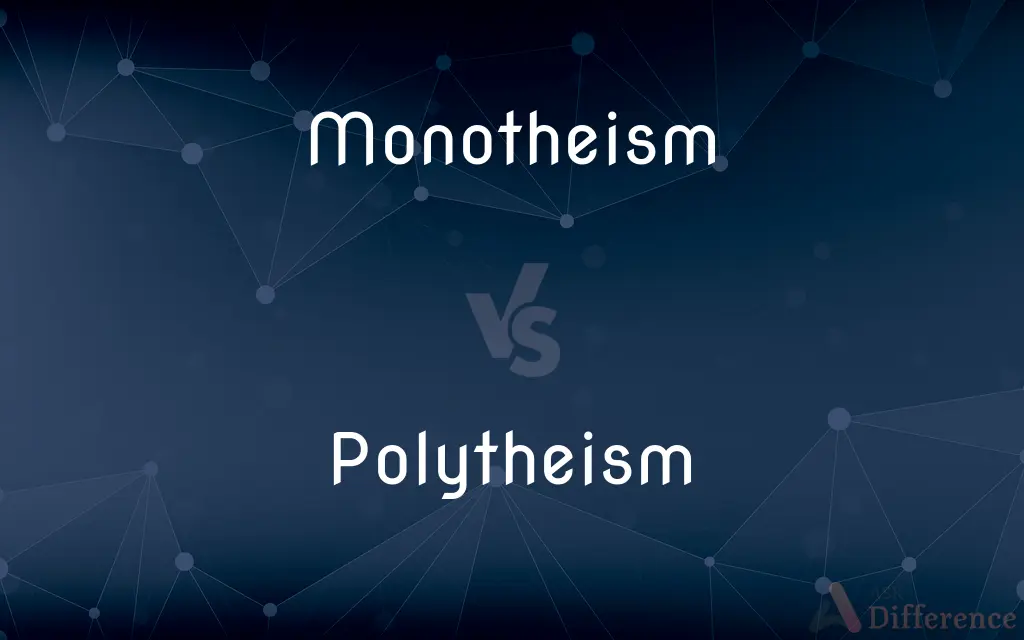Monotheism vs. Polytheism — What's the Difference?
By Tayyaba Rehman — Updated on November 1, 2023
Monotheism is the belief in one god, while polytheism involves belief in multiple gods.

Difference Between Monotheism and Polytheism
Table of Contents
ADVERTISEMENT
Key Differences
Monotheism centers on the belief in a single, all-powerful deity. In contrast, polytheism encompasses belief systems that recognize multiple gods, each with distinct roles or powers.
The concept of divine unity is fundamental to monotheism, where the single deity is often seen as the creator and sustainer of the universe. Polytheism, however, involves a pantheon of gods, often representing various aspects of nature or human experience.
Monotheistic religions typically have a centralized religious text or doctrine. Polytheistic religions may have a variety of myths, legends, and texts, reflecting the diversity of their deities.
In monotheism, the relationship between humans and the divine often focuses on moral and ethical guidance from the single deity. Polytheism usually involves a more complex interplay of relationships between humans and the multiple gods.
Monotheistic faiths often view their god as omnipresent and omniscient. Polytheistic beliefs generally attribute specific domains or powers to different gods, without the notion of omnipresence or omniscience.
ADVERTISEMENT
Comparison Chart
Number of Gods
One
Multiple
Divine Attributes
Omnipotent, omniscient
Specific powers or domains
Nature of Deity
Often creator and sustainer
Representing various aspects
Religious Texts
Centralized text or doctrine
Variety of myths and legends
Divine-Human Relationship
Moral guidance from single deity
Complex relationships with multiple gods
Compare with Definitions
Monotheism
Belief in the existence of only one god.
Christianity is a form of monotheism.
Polytheism
Belief in or worship of multiple gods.
Ancient Greek religion was polytheistic.
Monotheism
A religious system centered around a singular divine entity.
Judaism is an ancient monotheism.
Polytheism
A religious system with a pantheon of deities.
Hinduism is often described as a form of polytheism.
Monotheism
The worship of a single, all-powerful deity.
Monotheism often involves the worship of an omnipotent god.
Polytheism
Worship involving multiple divine beings.
Polytheism was common in ancient civilizations.
Monotheism
A faith tradition with one god as the central figure.
Islam is a monotheistic religion.
Polytheism
The doctrine that there are several gods.
Polytheism involves the acknowledgment of many gods.
Monotheism
Monotheism is the belief in one god. A narrower definition of monotheism is the belief in the existence of only one god that created the world, is omnipotent, omnipresent and omniscient.A distinction may be made between exclusive monotheism, and both inclusive monotheism and pluriform (panentheistic) monotheism which, while recognising various distinct gods, postulate some underlying unity.Monotheism is distinguished from henotheism, a religious system in which the believer worships one god without denying that others may worship different gods with equal validity, and monolatrism, the recognition of the existence of many gods but with the consistent worship of only one deity.
Polytheism
A belief structure featuring a multitude of gods.
Norse mythology is an example of polytheism.
Monotheism
The doctrine or belief that there is only one God.
Polytheism
Polytheism is the worship of or belief in multiple deities, which are usually assembled into a pantheon of gods and goddesses, along with their own religions and rituals. Polytheism is a type of theism.
Monotheism
The doctrine or belief that there is only one God.
Polytheism
The belief in or worship of more than one god
The polytheism of the ancient Near East
Monotheism
(obsolete) Belief in the One True God, defined by Moore as personal, immaterial and trinitarian.
Polytheism
The worship of or belief in more than one god.
Monotheism
The belief in a single deity (one god or goddess); especially within an organized religion.
Polytheism
The belief in the existence of multiple gods.
Monotheism
The belief that God is one person (Judaism, Christianity, Islam), not three persons (Trinitarianism, Hinduism)
Polytheism
The doctrine of, or belief in, a plurality of gods.
In the Old Testament, the gradual development of polytheism from the primitive monotheism may be learned.
Monotheism
The doctrine or belief that there is but one God.
Polytheism
Belief in multiple Gods
Monotheism
Belief in a single God
Common Curiosities
What is monotheism?
Monotheism is the belief in a single, all-powerful deity.
Are there modern examples of polytheism?
Yes, Hinduism is often considered a modern polytheistic faith.
What is polytheism?
Polytheism is the belief in or worship of multiple gods.
How do monotheists view their god?
Monotheists typically view their god as omnipotent and omniscient.
Do polytheistic beliefs have sacred texts?
Yes, but they often encompass a variety of myths and legends rather than a single doctrine.
Is the moral guidance different in monotheism?
Generally, monotheistic religions have moral codes believed to be given by the single deity.
Can monotheism and polytheism coexist?
In some cultures, elements of both have coexisted, but they are fundamentally different.
Can you give examples of monotheistic religions?
Examples include Christianity, Judaism, and Islam.
Are there ethical differences between monotheism and polytheism?
Ethical teachings can vary widely within both monotheistic and polytheistic traditions.
In polytheism, do gods represent natural forces?
Often, yes. Many gods in polytheistic beliefs represent aspects of nature or human experience.
How is the creation of the universe viewed in monotheism?
Often, the universe is believed to be created by the single, all-powerful deity.
Do monotheistic religions have prophets or messengers?
Many monotheistic religions have prophets or messengers who convey the deity's words or will.
Can an individual be both monotheistic and polytheistic?
Generally, these beliefs are mutually exclusive, but personal beliefs can vary.
Do polytheistic religions have a main god?
Some do, but often there is a pantheon with no single supreme deity.
How do monotheistic and polytheistic views of afterlife differ?
These views vary greatly among different religions and can't be generalized based on the number of deities.
Share Your Discovery

Previous Comparison
Consistent vs. Consistence
Next Comparison
Hustle vs. BustleAuthor Spotlight
Written by
Tayyaba RehmanTayyaba Rehman is a distinguished writer, currently serving as a primary contributor to askdifference.com. As a researcher in semantics and etymology, Tayyaba's passion for the complexity of languages and their distinctions has found a perfect home on the platform. Tayyaba delves into the intricacies of language, distinguishing between commonly confused words and phrases, thereby providing clarity for readers worldwide.
















































